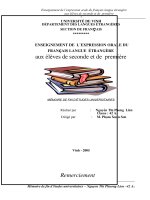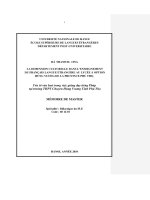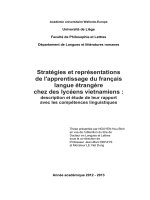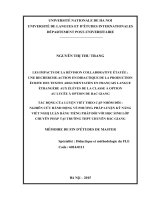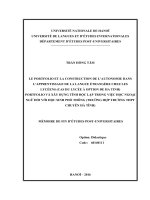Stratégies et représentations de lapprentissage du francais langue étrangère chez des lycéens Vietnamiens : description et étude de leur rapport avec les compétences linguistiques
Bạn đang xem bản rút gọn của tài liệu. Xem và tải ngay bản đầy đủ của tài liệu tại đây (156.55 KB, 5 trang )
Académie universitaire Wallonie-Europe
Université de Liège
Faculté de Philosophie et Lettres
Département de Langues et littératures romanes
Stratégies et représentations
de l'apprentissage du français
langue étrangère
chez des lycéens vietnamiens :
description et étude de leur rapport
avec les compétences linguistiques
Thèse présentée par NGUYEN Huu Binh
en vue de l’obtention du titre de
Docteur en Langues et Lettres
sous la co-direction de
Professeur Jean-Marc DEFAYS
et Monsieur LE Viet Dung
Année académique 2012 - 2013
Tóm tắt
Nghiên cứu này tập trung tìm hiểu quan niệm về việc học ngoại ngữ và các chiến lược
mà người học sử dụng trong quá trình học tập. Đây là lĩnh vực thu hút sự quan tâm của
các nhà nghiên cứu trong những năm gần đây. Vậy người Việt Nam có chiến lược gì khi
học ngoại ngữ tiếng Pháp ? Quan điểm của họ về việc học tiếng nước ngoài như thế
nào ? Các yếu tố vừa nêu có liên quan đến năng lực ngôn ngữ của học viên hay không ?
Việc giải đáp các vấn đề trên được thực hiện theo phương pháp nghiên cứu định lượng
thông qua ba công cụ đo lường : Thang đo chiến lược học tập ngôn ngữ (Oxford, 1990),
Thang đo quan điểm học ngôn ngữ (Horwitz, 1988) và một bài kiểm tra đánh giá năng
lực ngôn ngữ.
Công trình bao gồm hai công đoạn chính. Trước tiên, các thang đo được kiểm định và
điều chỉnh phù hợp với thực tế Việt Nam. Sau đó, phân tích thống kê (mô tả và suy
luận) cho phép trả lời các câu hỏi nghiên cứu đặt ra. Kết quả cho thấy người Việt Nam
có nhiều quan điểm khác nhau về việc học ngoại ngữ tiếng Pháp. Hơn nữa, khi học họ
sử dụng khá đa dạng các chiến lược học tập ngôn ngữ nhưng tần suất sử dụng thấp.
Ngoài ra, mối quan hệ giữa chiến lược và quan điểm học ngoại ngữ cũng như mối quan
hệ giữa các yếu tố này với năng lực ngôn ngữ đều có ý nghĩa thống kê.
Sau khi thảo luận và giải thích kết quả, nghiên cứu đưa ra một số khuyến nghị dành cho
các đối tượng liên quan đến việc dạy và học tiếng Pháp như là ngoại ngữ tại Việt Nam.
Từ khóa : chiến lược học tập ngôn ngữ, quan niệm vể việc học ngôn ngữ, năng lực
ngôn ngữ, ngoại ngữ Pháp văn, Việt Nam
Abstract
Strategies that language learners use and their beliefs about language learning are fields
that have interested many researchers in recent years. So, what are language learning
strategies used by Vietnamese learners of French as foreign language? What are their
beliefs concerning language learning? Is there any relationship between these elements
and proficiency?
This is what we propose to study in this doctoral work using quantitative approach with
three main research tools: the Strategy Inventory for Language Learning (Oxford,
1990), the Beliefs About Language Learning Inventory (Horwitz, 1988) and a linguistic
test.
We start this research by meeting the important requirement of the cross-cultural
validation of the adopted questionnaires. Then, statistical analysis (descriptive and
inferential) will allow us to answer to research questions. The results show that
Vietnamese learners have limited and varied strategy use and they have different beliefs
about the learning of French as a foreign language. Furthermore, the relationship
between strategy use and representations, on the one hand, and between these elements
and proficiency, on the other hand, is statistically significant. However, it is fairly
complex.
To conclude this thesis, we will try to provide possible explanations and point out
implications. This discussion will lead to some recommendations aimed at different
players involved in the teaching/learning of French in Vietnam.
Keywords: language learning strategy, beliefs about language learning, proficiency,
French as foreign language, Vietnam
Résumé
Les stratégies que les apprenants de langues déploient et les représentations qu’ils
possèdent à propos de leur apprentissage constituent des domaines qui arrivent à attirer
pleinement l’attention des chercheurs ces dernières années. Alors, quelles stratégies
d’apprentissage des langues utilisent les Vietnamiens qui apprennent le français comme
langue étrangère ? Que pensent-ils de cet apprentissage ? Existe-t-il des relations entre
ces éléments et les compétences linguistiques ?
C’est ce que nous nous sommes proposé d’étudier dans ce travail doctoral en recourant
à l’approche quantitative au moyen de trois outils de recherche : le Strategy Inventory
for Language Learning (Oxford, 1990), le Beliefs About Language Learning Inventory
(Horwitz, 1988) et un test de compétences.
Cette recherche a débuté avec la validation transculturelle des questionnaires adoptés.
Par la suite, les analyses statistiques (descriptives et inférentielles) ont permis de
répondre aux questions de recherches. Les résultats montrent que les apprenants
vietnamiens ont un recours plutôt limité et diversifié aux stratégies, et qu’ils possèdent
différentes opinions sur l’apprentissage du français. D’autre part, la relation entre les
stratégies et les représentations, d’une part, et entre ces éléments avec les compétences
linguistiques, d’autre part, a été statistiquement significative. Pourtant, elle s’avère
assez complexe.
Les discussions et les implications qui clôtureront cette thèse tenteront d’avancer
certaines explications et aboutiront à quelques recommandations réservées aux
différents acteurs participant à l’enseignement/apprentissage du français langue
étrangère au Vietnam.
Mots-clés : stratégies d’apprentissage des langues, représentations sur l’apprentissage
des langues, compétences linguistiques, français langue étrangères (FLE), Vietnam

